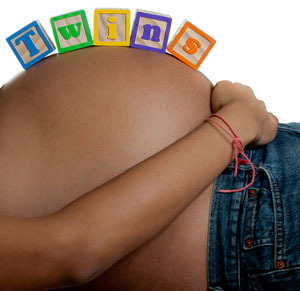
Have a twin pregnancy and don't know what to expect? You’re not alone. Most women expecting twins aren’t sure what to expect, but just because you don’t know, doesn’t mean you can’t learn. Not to worry, the following will share with you some of the most important details about being pregnant with twins.
8 Things You Should Know About Twin Pregnancy
1. You Will Need More Nutrients
You will especially need to take in more folic acid, calcium, iron, prenatal vitamins and protein and other nutrients if you are diagnosed with twin pregnancy. Be sure to maintain a healthy diet by avoiding high sugar and fattening foods. Talk with your doctor to see if you may also need an iron supplement.
2. You Will Need More Check-Ups
Your health care provider will want to meet you often to conduct ultrasounds and other possible tests to ensure the babies’ health. They will also want to track the growth and development of your babies while watching out for preterm labor signs. This may mean more check-ups, but you will feel more comfortable knowing the doctor is watching you closely to make sure your babies arrive healthy.
3. You Will Gain More Weight
If you are at a healthy weight before conceiving twins, you will have to gain 7-54 pounds to maintain your babies’ growth. This will equal approximately six hundred additional calories a day, depending on your activity level. Gaining weight is vital to your babies’ health, as it provides them with the appropriate nutrients. Discuss your calorie intake with your doctor to make sure you are consuming the right amount to sustain not only yourself, but your growing twins.
4. You Will Need Extra Precautions
With a twin pregnancy, you will want to be more careful once you have conceived. However, once you learn you are having twins, your doctor may want you to take it easy when it comes to work, travel and physical exercise. Modifying and moderating these activities will hopefully reduce any future complications. Although bed rest is not shown to prevent preterm labor, it does help encourage fetal growth and may prevent certain difficulties.
5. You May Have Worse Pregnancy Symptoms
With twins, you will have higher hCG levels which is most prevalently believed to cause morning sickness. Unfortunately, this means you are more likely to suffer from nausea and vomiting.Along with worse morning sickness, women pregnant with twins often complain of things like back pain, difficulty sleepingand constant heartburn throughout their pregnancy. Once you give birth to your twins, you may be at higher risk of maternal anemia and postpartum hemorrhage.
6. You May See More Spotting
Some spotting is perfectly normal; a minimal amount at the beginning of your twin pregnancy is often considered as implantation bleeding. Spotting during the first trimester,however, may be a sign of miscarriage, which is more common in women carrying multiples. Nevertheless, if the spotting is very light and not accompanied by cramps, you should not worry. If you are experiencing cramping with active bleeding and/or the passing of clots, you should seek medical help immediately. Although not necessarily a sign that you are having a miscarriage, it is a sign that something is happening which you should discuss with your doctor.
7. You May Have a Higher Risk of Having Potential Complications
- Preterm labor: With twins you can expect to go into labor around 36 weeks. If your twins are born after the 34-week mark, they should be perfectly healthy. If they are born before 34 weeks and weigh below 5.5 pounds, they may have more health complications and respiratory issues than others. Unfortunately, there is no proven way to prevent preterm labor.
- Gestational diabetes: Since you are carrying twins, you are more likely to develop gestational diabetes. If you develop this condition, it is important to monitor your blood sugar levels closely while using diet and exercise to maintain them at a normal level, although some women may need insulin shots or pills. Regardless, if you develop gestational diabetes, it is important to keep it under control to prevent any complications.
- Placental abruption: Placental abruption means the placenta detaches from the uterine wall before the baby is delivered, and it can happen at any time during the second half of your pregnancy with multiples. When it occurs, it can cause anything from growth problems and preterm delivery to stillbirth, and your babies will have to be delivered by cesarean section.
- Preeclampsia: This is an extremely serious condition caused by high blood pressure and protein in your urine, kidney or liver. Once it develops, it can cause serious, sometimes life-threatening conditions in the placenta and in your own organs. It tends to develop early in about 10-15% of pregnancies with multiples.
- Twin-twin transfusion syndrome: A twin to twin transfusion occurs when blood flows between the shared placenta of identical twins. It is a rare and serious complication that affects 10-15% of identical twins. Fortunately, it can be treated through a laser surgery which seals the blood vessel connection between the babies.
8. You May Need to Have a C-Section
Along with all of the other complications you may face when having a twin pregnancy, you are significantly more like to end with a cesarean section. While it is possible for some women with multiples to deliver vaginally, your doctor may deem the risk too high and determine that a c-section is the safest route. With twins, the babies are more likely to be in a breech position, making vaginal delivery impossible.
Want to see a real-life twin pregnancy experience? Check out this beautiful video:

